#Mustafa Zaidi
Text

when Parveen Shakir said “muddaton baad us ne aaj mujh se koi gila kia, mansab-e-dilbari pe kya mujh ko bahal kar diya” and when Mustafa Zaidi said “is se bhi to kuch rabt jhalakta hai ke vo ankh, bus ham pe inayat mein mohtat rahi hai”
#parveen shakir#mustafa zaidi#urdupoetry#desi#dark academia#poetry#desi academia#urdu literature#urdu shayari#urdu aesthetic#desi dark academia#mehreen khan#desiblr#desi romance#desi aesthetic#poetry aesthetic#poetry blog#pakistani dramas
60 notes
·
View notes
Text





In the middle of the night her ladyship goes into labor... and safely delivers twins! An heir, Haziqa Zaidi and her brother Mustafa Zaidi.
11 notes
·
View notes
Text

Mustafa Zaidi and his friend Shahnaz Gul.
0 notes
Text
इन्हीं पत्थरों पे चल कर अगर आ सको तो आओ
मिरे घर के रास्ते में कोई कहकशाँ नहीं है
~Mustafa Zaidi
#two line shayari#hindi shayari#urdu shayari#sher o shayari#shayaari#urdu poems#ghazal#urdu ghazal#ten word poem#depressing poem#sad poems#dark academism#dark academia#depressing life#heartbreak#fuck you#heartache#gay#mental health#why did you leave#what do i do#letting go
13 notes
·
View notes
Text
تم ہنسو تو دن نکلے، چپ رہو تو راتیں ہیں
کس کا غم، کہاں کا غم، سب فضول باتیں ہیں


Tum Hanso To Din Nikle, Chup Raho To Ratein Hain
Kis Ka Gham, Kahan Ka Gham, Sab Fazool Batein Hain
Mustafa Zaidi
#desi poetry#urdu shairi#urdu lines#urdu aesthetic#poetry#love#night#urdu shayari#urduadab#urdu poetry#urdu stuff#mehboob
9 notes
·
View notes
Note
you write urdu very well apko urdu litrature pasnd hai ? kyunke apka zok bohot acha hai words me evn if apka urdu bg nahi hai ma sha Allah
Yeah, there was a time I was obsessed with Urdu literature., And yes, I didn't study Urdu as a subject in school, learnt from my friends in college. They taught me basics n then I practiced it later. Alhamdulillah. Because, the place where I stay, it's multilingual. We have 4+ language speaking people here so I was kinda fascinated to learn more languages 😅
We speak dakhni Hindi at home, which is a mix of Hyderabadi Urdu n Hindi with a finer dialect.
I enjoy reading Urdu poems though. Mustafa Zaidi and Siraj Aurangabadi were my favourites. But, now I'm reading Ahmed Faraz, Faiz Ahmed Faiz n others too :)
2 notes
·
View notes
Text
میری قسمت میں بس اک سلسلۂ شام و سحر میرے کمرے کے مقدر میں فقط تنہائی
Only a series of evenings and mornings in my fate.Only loneliness is destined for my room.
Mustafa Zaidi
7 notes
·
View notes
Text
A prison sentence on corruption charges for a former director of an Iraqi payment card company, linked to the Popular Mobilization Forces
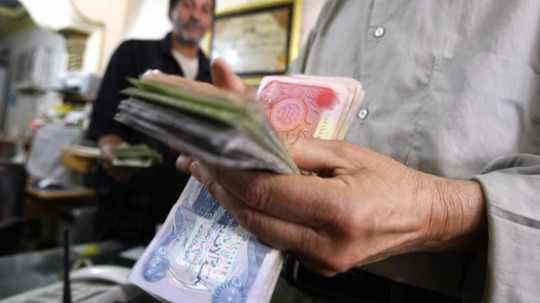
News: After a months-long investigation, the Iraqi judiciary issued a prison sentence against the former director of Qi Card, Bahaa Abdul Hussein, who was arrested in September 2020 and remained in the custody of the authorities until he was convicted on corruption charges, and a fine of more than 10 million was imposed on him. Millions of Iraqi dinars (6,846 US dollars). Qi Card is considered a pioneer in providing electronic payment services in the country, as it facilitates the payment of salaries and pensions for more than a million Iraqis.
Coverage: The official Iraqi News Agency (INA) reported on January 24 that the Iraqi Anti-Corruption Court issued a four-year prison sentence against the director of Qi Card for bribing the former head of the National Retirement Authority, Ahmed Abdel Jalil Al-Saadi. The agency added that the sentence against Abdul Hussein came based on the investigations of the Corruption and Important Crimes Committee that was established by the Prime Minister, Mustafa Al-Kadhimi , last August. It should be noted that the Iraqi journalist, Mazen Al-Zaidi, had published a tweet on January 13, attaching it to a television interview by the politician Faiq Sheikh Ali, in which he claimed that the former director of Qi Card, Abdul Hussein, had made his confessions under torture.
Most Iraqi and regional media covered this news with coverage similar to that of the official Iraqi News Agency (INA), including the Iraqi National News Agency (NINA) , Baghdad Al-Youm , The National website , and the��Ultra Iraq website .
The independent Iraqi media outlet, Nas, also published a report on January 24 focusing on the charges against the former head of the National Retirement Authority, Al-Saadi, against whom the court issued a six-year prison sentence and a fine of 10 million Iraqi dinars (US$6,846). ) for receiving bribes from Abdul Hussein. A special security force, SWAT , arrested Al -Saadi at his home, and six other officials, as part of an anti-corruption campaign.
The arrest of Abdul Hussein and Al-Saadi last fall generated shock waves on social media in Iraq, as reactions varied among users on the Yalla page , a Facebook page that is very popular in Iraq. While some considered that the sentences were intended to sacrifice scapegoats in order to protect prominent figures, others expected that pardons would be issued for the convicted corrupt people in the end.
Context/Analysis: Qi Card was established as a joint project between the private sector, represented by the Iraqi Electronic Payment Systems Company, and the government sector, represented by Rafidain Bank. This project established the International Smart Card Company (ISC) in Baghdad in 2007, which manages the Qi card.
According to a report reported by the Financial Times (FT) in 2019, the International Smart Card Company (ISC) had transferred salaries, benefits, and pensions to seven million Iraqis through the Qi Card prepaid card service. Reports issued in 2017 indicated that only 23 percent of Iraqis over the age of 15 have accounts in financial institutions.
Several media outlets claimed that the Popular Mobilization Forces had misused Qi Card services. Last July , the New York Times made strong allegations accusing the Popular Mobilization Forces of registering 70,000 “alien” elements in the Qi Card electronic payment system.
According to the Times, the goal was to embezzle approximately $800 million annually. In a recent report published on January 2 of this year, the Middle East Eye website claimed that the slain deputy head of the Popular Mobilization Forces, Abu Mahdi al-Muhandis, was personally involved in the alleged plot.
The dispute over Qi Card is likely to have political dimensions. Given the existing tension between Al-Kadhimi and the Popular Mobilization Forces, the Prime Minister may attempt to put pressure on the Mobilization Forces or on its leaders who may be involved in suspicious transactions alongside the former Key Card director, Abdul Hussein. According to the Middle East Eye report , Abdul Hussein’s arrest affected the payment of the salaries of tens of thousands of Popular Mobilization Forces fighters and retirees.
The Future: Corruption issues are likely to increase, before the Iraqi parliamentary elections scheduled to be held next fall, as the opposing forces, in the political and security spheres, are expected to attempt to settle scores and mobilize voter support.
If the sentences against Abdul Hussein and Al-Saadi do not spark an anti-Kadhimi political backlash, the latter will likely be emboldened to take bolder steps to target corrupt (and rival) figures with stronger political support from influential parties and paramilitary groups.
The more Al-Kadhimi takes such measures - even if they are extremely dangerous - the more likely he is to remain in office after the elections. However, Al-Kadhimi has significantly announced that he is determined to step down after the end of his current term later this year.
0 notes
Text
A prison sentence on corruption charges for a former director of an Iraqi payment card company, linked to the Popular Mobilization Forces
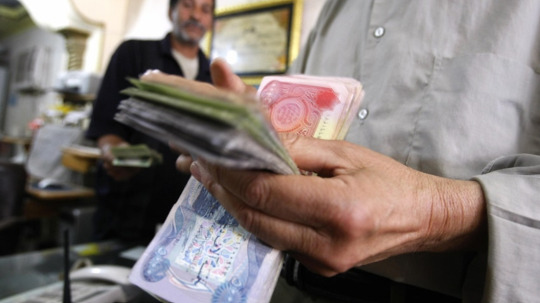
News: After a months-long investigation, the Iraqi judiciary issued a prison sentence against the former director of Qi Card, Bahaa Abdul Hussein, who was arrested in September 2020 and remained in the custody of the authorities until he was convicted on corruption charges, and a fine of more than 10 million was imposed on him. Millions of Iraqi dinars (6,846 US dollars). Qi Card is considered a pioneer in providing electronic payment services in the country, as it facilitates the payment of salaries and pensions for more than a million Iraqis.
Coverage: The official Iraqi News Agency (INA) reported on January 24 that the Iraqi Anti-Corruption Court issued a four-year prison sentence against the director of Qi Card for bribing the former head of the National Retirement Authority, Ahmed Abdel Jalil Al-Saadi. The agency added that the sentence against Abdul Hussein came based on the investigations of the Corruption and Important Crimes Committee that was established by the Prime Minister, Mustafa Al-Kadhimi , last August. It should be noted that the Iraqi journalist, Mazen Al-Zaidi, had published a tweet on January 13, attaching it to a television interview by the politician Faiq Sheikh Ali, in which he claimed that the former director of Qi Card, Abdul Hussein, had made his confessions under torture.
Most Iraqi and regional media covered this news with coverage similar to that of the official Iraqi News Agency (INA), including the Iraqi National News Agency (NINA) , Baghdad Al-Youm , The National website , and the Ultra Iraq website .
The independent Iraqi media outlet, Nas, also published a report on January 24 focusing on the charges against the former head of the National Retirement Authority, Al-Saadi, against whom the court issued a six-year prison sentence and a fine of 10 million Iraqi dinars (US$6,846). ) for receiving bribes from Abdul Hussein. A special security force, SWAT , arrested Al -Saadi at his home, and six other officials, as part of an anti-corruption campaign.
The arrest of Abdul Hussein and Al-Saadi last fall generated shock waves on social media in Iraq, as reactions varied among users on the Yalla page , a Facebook page that is very popular in Iraq. While some considered that the sentences were intended to sacrifice scapegoats in order to protect prominent figures, others expected that pardons would be issued for the convicted corrupt people in the end.
Context/Analysis: Qi Card was established as a joint project between the private sector, represented by the Iraqi Electronic Payment Systems Company, and the government sector, represented by Rafidain Bank. This project established the International Smart Card Company (ISC) in Baghdad in 2007, which manages the Qi card.
According to a report reported by the Financial Times (FT) in 2019, the International Smart Card Company (ISC) had transferred salaries, benefits, and pensions to seven million Iraqis through the Qi Card prepaid card service. Reports issued in 2017 indicated that only 23 percent of Iraqis over the age of 15 have accounts in financial institutions.
Several media outlets claimed that the Popular Mobilization Forces had misused Qi Card services. Last July , the New York Times made strong allegations accusing the Popular Mobilization Forces of registering 70,000 “alien” elements in the Qi Card electronic payment system.
According to the Times, the goal was to embezzle approximately $800 million annually. In a recent report published on January 2 of this year, the Middle East Eye website claimed that the slain deputy head of the Popular Mobilization Forces, Abu Mahdi al-Muhandis, was personally involved in the alleged plot.
The dispute over Qi Card is likely to have political dimensions. Given the existing tension between Al-Kadhimi and the Popular Mobilization Forces, the Prime Minister may attempt to put pressure on the Mobilization Forces or on its leaders who may be involved in suspicious transactions alongside the former Key Card director, Abdul Hussein. According to the Middle East Eye report , Abdul Hussein’s arrest affected the payment of the salaries of tens of thousands of Popular Mobilization Forces fighters and retirees.
The Future: Corruption issues are likely to increase, before the Iraqi parliamentary elections scheduled to be held next fall, as the opposing forces, in the political and security spheres, are expected to attempt to settle scores and mobilize voter support.
If the sentences against Abdul Hussein and Al-Saadi do not spark an anti-Kadhimi political backlash, the latter will likely be emboldened to take bolder steps to target corrupt (and rival) figures with stronger political support from influential parties and paramilitary groups.
The more Al-Kadhimi takes such measures - even if they are extremely dangerous - the more likely he is to remain in office after the elections. However, Al-Kadhimi has significantly announced that he is determined to step down after the end of his current term later this year.
1 note
·
View note
Text
The Best True Crime Podcasts and Documentaries to Stream Now
In this podcast, one of Pakistan’s first in the true crime realm, we travel to Karachi in the late 1960s and early ’70s, when the city’s lust-fueled nightlife and high-society scandals would rival the most sensational eras of Hollywood or New York.
This story has it all: the mysterious death of a tortured poet, Mustafa Zaidi, whose body was found next to his unconscious muse and lover, the…
View On WordPress
0 notes
Text




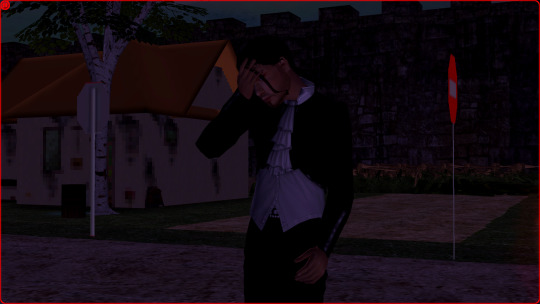
The spring season comes to a close as Raymond gets home exhausted. A recent promotion has made it so he works later, and the change is a struggle. Aisha finishes the round with spending some time with her youngest children, a rare luxury she's hardly been able to enjoy this round
#aisha zaidi#raymond zaidi#haziqa zaidi#mustafa zaidi#julietta velaquez#zaidi#hadria#criladith round 2#criladith
7 notes
·
View notes
Link
0 notes
Text
youtube
Watch the American Climate Leadership Awards 2024 now: https://youtu.be/bWiW4Rp8vF0?feature=shared
The American Climate Leadership Awards 2024 broadcast recording is now available on ecoAmerica's YouTube channel for viewers to be inspired by active climate leaders. Watch to find out which finalist received the $50,000 grand prize! Hosted by Vanessa Hauc and featuring Bill McKibben and Katharine Hayhoe!
#ACLA24#ACLA24Leaders#youtube#youtube video#climate leaders#climate solutions#climate action#climate and environment#climate#climate change#climate and health#climate blog#climate justice#climate news#weather and climate#environmental news#environment#environmental awareness#environment and health#environmental#environmental issues#environmental justice#environment protection#environmental health#Youtube
17K notes
·
View notes
Video
Hello Holidays from James Nilsen-Misra on Vimeo.
Director: RaviUdyawar
DoP: Peter_Tischhauser_Rapperswil
Stills Photographer: Prasad Mahadeo Naik PrasadNaaik
Photography Assistant: Manish Mansinh Sampat ManishMansinh
Art Director: Lana Goodall
Set Decorator, Props : James Nilsen-Misra
Music Director: AmarMangrulkar
Editor: Ysuf H Khan yusuf_scissorhand
Dad: Saif Ali Kahn SaifAliKhan_Online
Mom: KareenaKapoorKhan
Son: Sudip Ghose
Costume: Lakshmi Rajesh Lehr LakshmiLehr
Costume: Sabina Halder SabinaHalder
Costume: Mischell Roche
Hair: Saagar Vilas Rahurkur Sagar_Rahurkar
Hair: Ioannis Yianni Tsaptori YianniTsapatori
Make-Up: Deepa.Verma.Makeup
Make-Up: Nilesh Chandrakant Kothavale NileshKothavale
Make-Up: Tryna Knock TrynaMakeItKnock
Agency: Whyness Worldwide
Chairman & Managing Director: RaviDeshpande1
Vp Creative: Ranjit_Sasidharan
Vice President - Business & Strategy: Chetan Vikram Mane
Campaign: Hello Holidays
Major Half-Century Rebranding
Brand: V.I.P. Luggage Vipstarluggage
Advertiser: Vip Industries
Head Marketing: Anirudh Anant Pandharkar
Brand Head: Aditya Govind Gadiyar
Brand Manager: Varun Sunil Arora
Brand Manager: Anshul Bhatia
Head Activations: Rohit Raaj
DGM Marketing International Business: Gautam Saha
CEO: Sudip Ghose, Former Exec Dir Marketing Samsonite South Asia
Production Company, Mumbai: Ru Films
Executive Producer: Mustafa Chawniwala MChawniwala
Producer: Kalpana.Udyawar
Assistant Director: ShivangiChauhan1708
Assistant Director: PriyankBhadkamkar
Assistant Director: Pulkit Sharma
Exceed Entertainment Exceedentertainment
Managing Director: Afsar Zaidi Afsarzaidi
Manager: JehanAhmed10
Matrix India Entertainment Consultants
Managing Director: ReshmaShetty
Director: Vivek Madhav Kamath
Manager: PoonamDamania
Production Company, Cape Town: Happy Cat Films FilmsHappyCat
Executive Producer: Rachel Young RachelRadicaCat
First Assistant Director: VincaCox
Line Producer: MurrayJamesMacDonald
Production Manager: Philip Townsend
Stills Coordinator: Neil Hermann
Post Production Studio: Famous_1945
Post Producer: Charudatt Kurdikar
Assistant Editor: RohanKhimani
Grading: Nicola.Gasparri
Online Editor: Rohit Padwal
Sound Engineer: Depangsu Roy
Music Recording Studio: Pluggin
0 notes
Text
Pervez Musharraf Dragged His Country Down
The charismatic Pakistani general aimed to be a great national leader but failed by shredding the constitution and recklessly doing Washington’s bidding.
— February 5, 2023 | By Mosharraf Zaidi, a Senior Partner at Tabadlab, an Advisory Services Firm | Foreign Policy
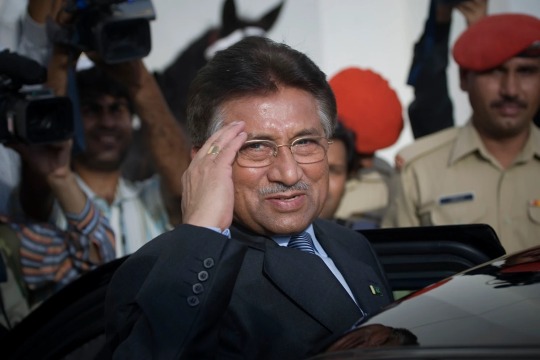
Outgoing President Pervez Musharraf salutes as he leaves the presidential house in Islamabad, Pakistan, on Aug. 18, 2008. Emilio Morenatti/AP
Gen. Pervez Musharraf, Pakistan’s Former President, died at age 79 in Dubai on Sunday after a long illness, according to a statement by the Pakistani military.
Musharraf’s military colleagues in Pakistan often praised him as daring, forthright, and brave—yet the primary legacy he leaves behind will feature none of those adjectives. Pakistan’s 10th president since independence will be remembered instead as a divisive, constitution-shredding military dictator who set Pakistan back decades.
When Musharraf took charge after a military coup in October 1999, Pakistan was not dissimilar from its neighbors China and India—countries with large populations but little economic vitality at the time. China and India, however, soon enjoyed massive growth as their economies opened up to the world and investments poured in and exports flowed out. Pakistan grew too—but not because of any changes in how Musharraf managed the economy. Instead, infusions of cash from the United States to help finance the so-called global war on terrorism bolstered solid (though unspectacular) macroeconomic numbers.
By the end of Musharraf’s tenure in 2008, Pakistan was a regional economic laggard. The country took yet another massive loan from the International Monetary Fund just weeks after he resigned. More importantly, however, insurgencies and violent political crises had engulfed three of Pakistan’s four provinces.
Democratic-minded Pakistanis often blame the United States for bolstering the country’s military dictators, and for good reason. Throughout the three extended periods when generals have run Pakistan—the 1960s, the 1980s, and the 2000s—they did so with vital political and economic support from Washington. That is what helped shore up every military dictator Pakistan has ever had to endure.
But Musharraf’s assistance to U.S. President George W. Bush’s war efforts reached a whole new level and made him something of a celebrity in the United States. In 2006, he became the first foreign head of state to appear on The Daily Show With Jon Stewart. It was a somewhat awkward appearance. Asked how he balanced the wishes of the United States and Pakistan, Musharraf said, “I’ve had to learn the art of tightrope-walking many times, and I think I’ve become quite an expert of that.”
He got a few laughs. But there was nothing funny about the mess he was trying to hide back home as he sought to further secure his grip on power by marketing himself as the sole Pakistani counterterrorism partner whom Americans could count on.
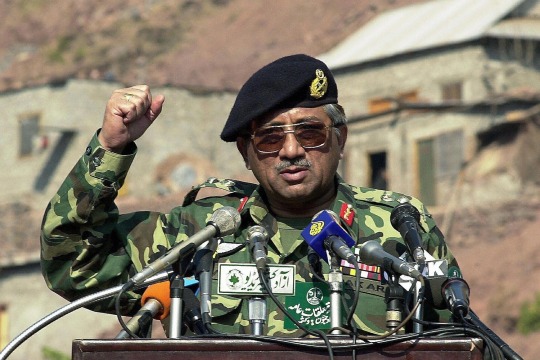
Musharraf gestures during an address to Kashmiri refugees in Muzaffarabad, in Pakistani-administered Kashmir, on Feb. 5, 2001. Saeed Khan/AFP via Getty Images
Born in 1943 to a middle-class household that migrated to Pakistan from India just four years later, Musharraf benefited from being in a well-educated and socially prominent family. His father worked for the government and eventually became a diplomat posted to Ankara, Turkey, where Musharraf spent seven years learning Turkish and growing fond of Mustafa Kemal Ataturk, the founding father of a sovereign and secular Turkey. At age 18, Musharraf joined the Pakistan Military Academy, from which he graduated with a bachelor’s degree in 1964.
He saw his first combat in Pakistan’s 1965 war with India, and he was also involved in combat operations in the 1971 war that led to the breakup of Pakistan (and the founding of Bangladesh). Musharraf came to be seen as a star officer and became a member of the elite Special Services Group of commandos in the Pakistan Army. He later taught at the Command and Staff College in Quetta and in the War Wing of the National Defence College.
In 1998, Musharraf was appointed head of the armed forces, only to be fired in October 1999 when he was traveling abroad. The armed forces, never keen to obey even the most benign orders of elected civilian leaders, refused to carry out the decision. In scenes more fitting for a cheap thriller one might buy at an airport bookshop, the Army took control of Karachi’s airport, helped land Musharraf’s plane as he returned from his foreign trip, and conducted a coup. Musharraf then appointed himself the head of yet another military government.
As president, his straight-talking, unvarnished style was welcomed by Pakistanis unaccustomed to that kind of candor from a public official. For Pakistan’s rising urban middle class, he became a patron of music, television, film, and fashion. But for the rest of the country—the vast majority—Musharraf’s rule was a time of violence, diminished control over their own lives, and the absence of democratic representation.
Musharraf’s most memorable reform effort was Local Government Ordinance 2001, which aimed to transfer many local services from higher tiers of government to more local authorities. The idea was to empower ordinary citizens and make the authorities overseeing municipal water, sanitation, and education services more responsive to the people using those services. For the first few years after it was enacted, the ordinance and the new systems it created seemed to be improving those services across the country.
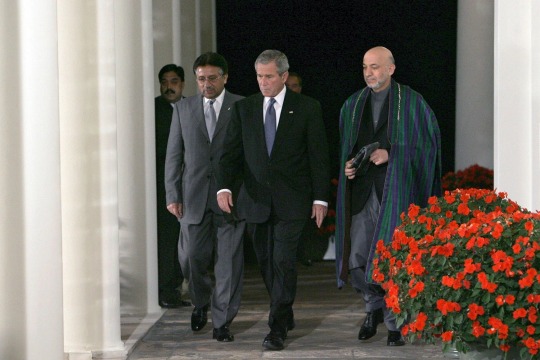
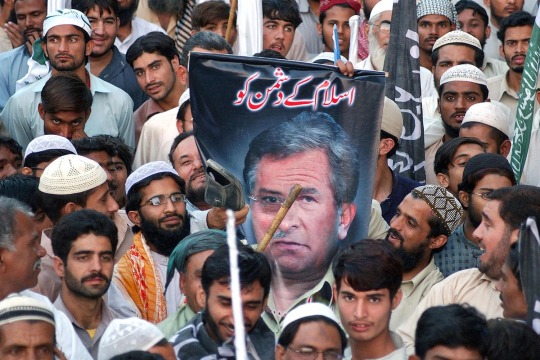
Top: U.S. President George W. Bush walks with Musharraf and Afghan President Hamid Karzai following a meeting at the White House in Washington, D.C., on Sept. 27, 2006. Mandel Ngan/AFP via Getty Images Bottom: Pakistani protesters hold a sign that shows half-faces of Musharraf and Bush during a demonstration in Karachi, Pakistan, on Nov. 26, 2006. Rizwan Tabassum/AFP via Getty Images
As with so many of Musharraf’s promises, though, there was no follow-through. Musharraf never delivered the necessary fiscal and political freedoms that would have ensured his reforms would last. He deliberately kept the four provincial governments weak and fiscally dependent on the largesse of the federal government. This ended up embittering ethnic minorities and deepening the suspicions of democrats already wary of Musharraf’s intentions. Both at the provincial and the national levels, Pakistan’s democratic institutions remained weak. And in 2006, Musharraf helped dismantle some of his own reforms to prolong his time as president—conceding changes to Local Government Ordinance 2001 as part of a deal with “elected” civilians who were actually installed to do his bidding. Despite Musharraf’s many protestations to the contrary, he never really favored democracy.
Nor did he respect the rights and multiple identities of his diverse citizenry. In Balochistan—the sparsely populated, poor, yet mineral-rich province that is now the site of some of China’s key investments in Pakistan’s infrastructure—Musharraf laid the foundation for a raging separatist insurgency. He responded to long-standing Baloch demands for greater access to the natural resources extracted from the province with contemptuous rejections. Key political leaders who articulated those demands were branded as traitors.
The tipping point probably came in 2006 when Nawab Akbar Bugti, a onetime government minister in Islamabad and former chief minister of the province, was killed in a standoff with the military. Bugti’s family accused Musharraf of having him assassinated. A 2016 court judgment cleared Musharraf of the charge, but many continue to believe that he was responsible. Even those with a tendency to align themselves with Musharraf blamed him for plunging the entire province into violence.
Meanwhile, the cost of fighting al Qaeda was not borne by Musharraf but by the thousands of Pakistani citizens, police officers, spies, and soldiers who were killed in reprisal attacks that metastasized into a full-blown terrorist insurgency in the north and northwest of the country. Bush understandably praised Musharraf for helping to fight his war, calling Musharraf “a leader with great courage and vision.” But for Pakistan, the fruits of that relationship were ruinous. From the home district of Malala Yousafzai in Pakistan’s northwest to the tribal areas bordering Afghanistan, full-scale military operations displaced and dislocated millions of Pakistani citizens throughout the decade that followed the Musharraf era—operations that were a response to restive and violent conditions that Musharraf, in trying to please Washington, had fostered or created.
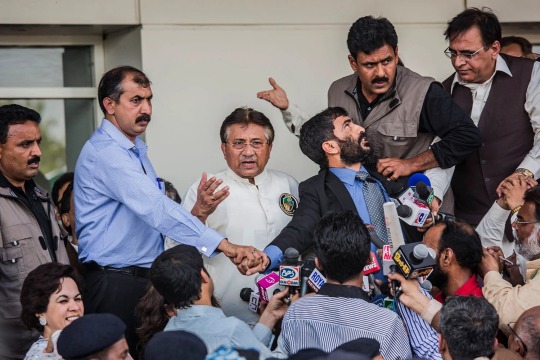
Musharraf addresses a crowd of supporters after landing at Jinnah International Airport in Karachi on March 24, 2013, after four years of self-imposed exile. Daniel Berehulak/Getty Images
Musharraf and his many supporters often cite the absence of better options—suggesting it would have been impossible to support U.S. counterterrorism campaigns in the aftermath of the 9/11 attacks without fueling a terrorist insurgency. And, yes, the challenge of being squeezed between U.S. pressure to conduct a war on terrorism and the domestic complexities of managing that war without igniting internal conflicts and tensions would have been difficult for any leader. Still, Pakistan never had a chance to debate or contemplate how to find a proper balance—Musharraf decided for the whole country.
In the nearly decade and a half between his resignation in 2008 and his death, Musharraf showed little capacity for reflection or remorse. When he did show glimpses of regret, they were transparently self-serving. At the launch of his own political party in October 2010, when questioned about what he did to counter corruption during his time in power, he apologized for having made a 2007 deal to enable former Prime Minister Benazir Bhutto to return to Pakistan. (She was assassinated on his watch as president.) Later that year, during an interview with Indian television, when confronted about how he left Pakistan in political and financial ruin, he expressed regret at having given up the position of chief of army staff too soon. In an interview in December 2013, as momentum was building for a Pakistani Supreme Court case in which he would have been tried for treason, Musharraf said, “Whatever I did, I did it for the country. It could be wrong, but there was no bad intention in it. Even then, if someone thinks that I have committed a mistake, I seek forgiveness for it.”
Those who wonder about the sincerity of his halting contrition need look no further than his actions toward the end of 2007. Growing increasingly weary of the upsurge in political, legal, and social challenges to his rule that had arisen throughout 2006, he tried to fire the country’s chief justice in March 2007. That decision backfired in July of that year when a 13-judge panel from the Supreme Court reinstated the justice. In response, Musharraf arranged to be elected as president by parliament in October. When that gambit backfired—with almost all opposition members either abstaining or resigning from parliament to protest the behavior of the Musharraf regime—he suspended the constitution altogether, declaring a state of emergency. In keeping with the global post-9/11 tradition of using terrorism as a basis for violating laws, he justified the emergency declaration on the basis of the “visible ascendancy in the activities of extremists and incidents of terrorist attacks.”
It’s not only his actions as the leader of the country after 1999 that will leave his legacy in tatters. Perhaps the most egregious violation of his oath as a soldier was not the coup he conducted in 1999, or the sham election he held in 2002, or the judges he tried to fire in 2007, or the emergency he declared in 2007. Rather, it was the Kargil War of 1999—a military entanglement that his supporters laud for its tactical robustness, yet whose strategic cost Pakistan continues to bear to this day.
Contingency plans for taking vulnerable parts of Indian-occupied Kashmir had been part of Pakistani military thinking for decades. In the late 1990s, several senior officers had sought to implement those plans, yet calmer heads had always prevailed, including the army chief who preceded Musharraf, a thoughtful and widely respected general named Jehangir Karamat. But in 1998, then-Prime Minister Nawaz Sharif fell out with Karamat and fast-tracked Musharraf’s appointment as chief of army staff. Among Musharraf’s first acts as military boss was to greenlight the covert infiltration that sparked the Kargil War.
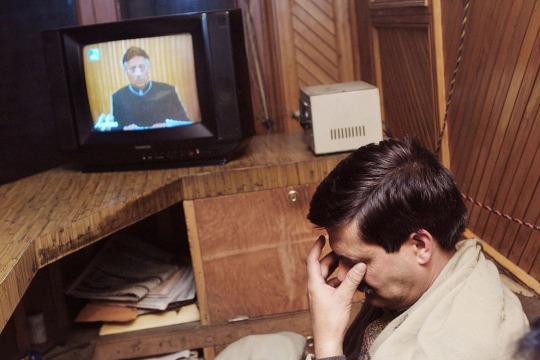
A Kashmiri man rubs his eyes as he watches a speech by Musharraf in Srinagar, in Indian-administered Kashmir, on Jan. 12, 2002. Musharraf gave a much-anticipated speech, saying he would not allow terrorism of any kind in Pakistan and asking for a peaceful resolution to the conflict in Kashmir. Chris Hondros/Getty Images
The war was supposed to liberate Kashmir from Indian occupation. Instead, hundreds of Pakistani soldiers were killed, and after an initial shock, India was able to push back and regain the territory it had held. Back home, Pakistan’s elected civilian leadership claimed to have been kept in the dark about the Kargil misadventure—and the resulting bitterness is what eventually led to Musharraf’s coup. At one point, U.S. President Bill Clinton was pulled into the crossfire, both between Musharraf and Sharif and between India and Pakistan. Bitterness and disappointment from Kargil in both Washington (for the dangerous escalation the intervention represented) and Pakistan (for the United States having refused to support Pakistan) led to a strategic falling-out between the United States and Pakistan. Those tensions never fully disappeared.
Recent political upheaval in Pakistan is essentially part of the toxicity that began with the disastrous Kargil misadventure. When disagreements between Pakistani politicians and generals boil over, the United States is the baton they use to beat each other up with. Unpredictability in Pakistani governance now seems like a given—but it wasn’t always this way. Gen. Pervez Musharraf was the gardener who planted and harvested those seeds.
To his credit perhaps, despite all his failings, Musharraf remained to the end a relatable figure for the vast middle class of Pakistan. Unlike so many other Pakistani leaders, including military dictators, his family seemed immune to the voracious appetite for money and power such people tend to have. Neither of his two children is a public figure, and neither stands accused of having benefited from the long period when their father enjoyed unlimited power in Pakistan. Previous dictators have left behind multiple generations of very wealthy, politically active offspring.
Musharraf, who had been living in self-imposed exile in Dubai since 2016, leaves behind an empty home in Islamabad and a few apartments in the Middle East and London. All empty. Just like his contrition, and his promises of uniting and reforming the nation.
0 notes
Photo

Pakistani true crime podcast Notes on a Scandal explores the mysterious death of poet Mustafa Zaidi 50 years later - Art & Culture
0 notes
Text
( آخری بار ملو )
آخری بار ملو ایسے کہ جلتے ہوئے دل
راکھ ہو جائیں کوئی اور تقاضہ نہ کریں
چاکِ وعدہ نہ سلے زخمِ تمنا نہ کِھلے
سانس ہموار رہے شمع کی لو تک نہ ہلے
باتیں بس اتنی کہ لمحے انہیں آ کر گن جائیں
آنکھ اٹھائے کوئی امید تو آنکھیں چھن جائیں
اس ملاقات کا اس بار کوئی وہم نہیں
جس سے اک اور ملاقات کی صورت نکلے
اب نہ ہیجان و جنوں کا نہ حکایات کا وقت
اب نہ تجدیدِ وفا کا نہ شکایات کا وقت
لٹ گئی شہرِ حوادث میں متاعِ الفاظ
اب جو کہنا ہے تو کیسے کوئی نوحہ کہیے
آج تک تم سے رگِ جاں کے کئی رشتے تھے
کل سے جو ہو گا اسے کون سا رشتہ کہیے
پھر نہ دہکیں گے کبھی عارض و رخسار ملو
ماتمی ہیں دمِ رخصت در و دیوار ملو
پھر نہ ہم ہوں گے نہ اقرار نہ انکار ملو
آخری بار ملو
(مصطفی زیدی)
#urdu shayari#poetry#urdu adab#urdulovers#urdu poetry#اردو#mustafa zaidi#اردو ادب#نظم#مصطفی زیدی#shayri#urdu stuff
22 notes
·
View notes
Text
youtube
Watch the 2024 American Climate Leadership Awards for High School Students now: https://youtu.be/5C-bb9PoRLc
The recording is now available on ecoAmerica's YouTube channel for viewers to be inspired by student climate leaders! Join Aishah-Nyeta Brown & Jerome Foster II and be inspired by student climate leaders as we recognize the High School Student finalists. Watch now to find out which student received the $25,000 grand prize and top recognition!
#ACLA24#ACLA24HighSchoolStudents#youtube#youtube video#climate leaders#climate solutions#climate action#climate and environment#climate#climate change#climate and health#climate blog#climate justice#climate news#weather and climate#environmental news#environment#environmental awareness#environment and health#environmental#environmental issues#environmental education#environmental justice#environmental protection#environmental health#high school students#high school#youth#youth of america#school
17K notes
·
View notes